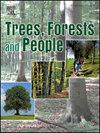The economics of forest restoration: A cost-effectiveness analysis of the leasehold forestry programme in Nepal
IF 2.7
Q1 FORESTRY
引用次数: 0
Abstract
In recent decades, Nepal's forest cover has increased significantly, primarily attributable to the community-based forest management approach. The Leasehold Forestry Programme (LFP) has been in place for three decades to reduce poverty. Given that the dynamics of forest ecosystems and socio-economic conditions evolve over time, it becomes imperative to evaluate not just whether the program achieves its original goals, but also whether it contributes to deliver ecological benefits and restoration outcomes in a cost-effective manner. However, the existing literature on cost effectiveness predominantly centres around community forestry. Therefore, this research comprehensively examined the cost-effectiveness of the LFP using a cost benefit analysis, focusing on case studies from Nepal's Gorkha, Tanahun and Nawalpur districts in the Chitwan Annapurna Landscape. For this study, 64 user groups were selected from 921 leasehold forests, using a three-stage cluster sampling technique. A household-level semi-structured questionnaire interview (n = 154 for control forest users and n = 320 for leasehold forest users) was conducted to ascertain the costs and benefits for the beneficiary households. Except for the carbon benefit, which was determined through a field-based biomass survey, we employed the benefit transfer approach for regulatory forest ecosystem services. The results indicate that leasehold forests perform better economically and contribute to the enhancement of user livelihoods compared to control forests. Emphasizing the leasehold programme's goal of ensuring fair access to and distribution of resources, this study underscores the importance of tenure certainty as a crucial factor in attracting prospective tenants and offering security for funding land restoration projects. However, recent modifications of the leasehold forestry tenure limit may impact the programme's future effectiveness.
森林恢复的经济学:尼泊尔租赁林业方案的成本效益分析
近几十年来,尼泊尔的森林覆盖率显著增加,这主要是由于以社区为基础的森林管理办法。为减少贫困,租赁林业方案(LFP)已经实施了三十年。鉴于森林生态系统的动态和社会经济条件随着时间的推移而变化,不仅要评估该计划是否实现了最初的目标,还要评估它是否有助于以具有成本效益的方式提供生态效益和恢复结果。然而,关于成本效益的现有文献主要集中在社区林业方面。因此,本研究利用成本效益分析全面考察了低成本计划的成本效益,重点研究了奇旺-安纳普尔纳景观中尼泊尔廓尔喀、塔纳洪和纳瓦尔布尔地区的案例研究。在本研究中,采用三阶段聚类抽样技术,从921个租赁林中选择了64个用户组。为了确定受益家庭的成本和收益,进行了一项家庭层面的半结构化问卷访谈(对照林使用者为154人,租赁林使用者为320人)。除了通过野外生物量调查确定的碳效益外,我们还采用了效益转移方法来调节森林生态系统服务。结果表明,与控制林相比,租赁林在经济上表现更好,有助于改善用户生计。本研究强调租赁权方案的目标是确保公平获得和分配资源,强调租赁权确定性作为吸引潜在租户和为土地恢复项目提供资金保障的关键因素的重要性。但是,最近对租赁森林权属限制的修改可能会影响该方案未来的效力。
本文章由计算机程序翻译,如有差异,请以英文原文为准。
求助全文
约1分钟内获得全文
求助全文
来源期刊

Trees, Forests and People
Economics, Econometrics and Finance-Economics, Econometrics and Finance (miscellaneous)
CiteScore
4.30
自引率
7.40%
发文量
172
审稿时长
56 days
 求助内容:
求助内容: 应助结果提醒方式:
应助结果提醒方式:


